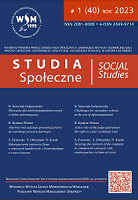ZABEZPIECZENIE INTERESÓW FIRMY W UMOWACH HANDLOWYCH Z KONTRAHENTAMI W CZASIE KRYZYSU
SECURING THE INTERESTS OF THE COMPANY IN COMMERCIAL CONTRACTS WITH COUNTERPARTIES IN TIMES OF CRISIS
Author(s): Sławomir Obszyński, Natalia Korab, Sławomir ŻurawskiSubject(s): Law, Constitution, Jurisprudence, Business Economy / Management, Security and defense, Accounting - Business Administration, Commercial Law
Published by: Menedżerska Akademia Nauk Stosowanych w Warszawie
Keywords: security; finance; contractor; crisis; threats;
Summary/Abstract: The cornerstone of any company’s operation is ensuring its security. One of the most important tasks is to maintain financial security. The main purpose of the article was to indicate the differences in the level of financial security with counterparties with the introduction of appropriate provisions in contracts in this area and with the absence of such provisions and disorderly operation of the company in this area. In the first part, the authors describe the basics of the contract with counterparties. Then they characterize the basic contractual clauses, pointing out their important role in international contracts. The main part presents clauses protecting the company’s interests in commercial contracts with counterparties in times of heightened risk. In conclusion, it was noted that the absence of force majeure provisions in commercial contracts can have serious consequences for both parties. The main research problem was formulated: How should a company secure its finances in contracts when executing long-term contracts, during a crisis? What risks are incurred when such safeguards are not applied? The following hypothesis was adopted: the contract entered into should reflect the assumptions of both parties as best as possible and provide for solutions to most potentially contentious issues. Failure to include safeguard clauses in the contract can bring serious consequences for the future of both contracting parties. Verifi cation of the above hypothesis and obtaining answers to the above questions required the use of qualitative methods including critical analysis of legal acts, documents and selected items of literature on the subject.
Journal: Studia Społeczne
- Issue Year: 40/2023
- Issue No: 1
- Page Range: 125-138
- Page Count: 14
- Language: Polish

